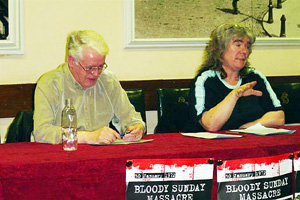1 April 2004 Edition
What we want is the truth, plain and simple

BY SEÁN Mac CONMARA (TROOPS OUT MOVEMENT) -
John Kelly, brother of Michael, and Mickey McKinney, brother of William, spoke in London, They were joined in Birmingham, Coventry and Preston by Cahill McElhinney, brother of Kevin.
In Coventry, they spoke at a meeting arranged to discuss the 1984 Amritsar massacre when hundreds of Sikhs were killed in the Punjab province in circumstances similar to Bloody Sunday.
The Bloody Sunday relatives had been invited to give updates on the Inquiry, its lessons and the feelings of the families.
At the meetings, Mickey McKinney explained how the political situation in Derry at the time affected the nationalist community's voting rights, housing allocation and job opportunities and how this led to the formation of the Derry Civil Rights Association.
He gave a history of the events leading up to Bloody Sunday before recounting the events of the day itself, ending with how the British Army stated on that day's evening news that they had engaged in a gun battle with the IRA and had killed gunmen and nail bombers.
John Kelly explained that following Bloody Sunday, the victims' families would only officially meet once a year at the Bloody Sunday Commemoration.
He said that it was decided to form the 'Bloody Sunday Justice Campaign' in 1992 on the 20th anniversary of the murders, with the aim to have the case reopened.
John said that some people in Derry "thought we were mad for taking on the British establishment". He recalled the difficulties that faced them until, eventually, six years later, Tony Blair announced to the British House of Commons that there would be a new inquiry into Bloody Sunday.
However, any optimism for a full, open, honest and transparent public inquiry was quashed when it was discovered that three days before Mr Blair's announcement to the Commons, the murder weapons were being destroyed.
"Those weapons were preserved for all those years" said John. "The British Ministry of Defence acted three days before the Inquiry was announced and destroyed evidence. It has been a continuous problem during the Inquiry. For instance, the hundreds of photographs put before Widgery and other documentation had now somehow, mysteriously disappeared."
He told how the 'open, independent, public inquiry' was constantly thwarted by the British establishment by way of seemingly endless High Court appeals, resulting in cypher numbers being allocated to witnesses, the screening of witnesses, Public Interest Immunity Certificates being issued and then by the Inquiry being moved to London to hear the soldiers' evidence.
John told of the emotional difficulties faced by the families during the Inquiry, especially when they faced and heard evidence from the very soldiers who had killed their loved ones.
"The shooters' evidence was the hardest to endure," explained John, "because the families were seeing, for the first time, the people who murdered our people.
"But it was worthwhile for us to see them, face to face, forced to give evidence that they clearly didn't want to give.
"On a personal level, to sit in the same room as the person who murdered my brother was the hardest to endure, it was."
John also told of the "collective amnesia" of the soldiers while giving evidence to the Inquiry.
He recalled the upsurge of media interest when Martin McGuinness gave evidence when the Inquiry returned to Derry and how it became "the Martin McGuinness Inquiry".
John informed the audiences that on Friday last, it emerged that the tribunal has written to the legal teams, the government, the police and MI5 to request details of notes and correspondence with witnesses which had been confidential until recently.
The request follows a Court of Appeal ruling in the BCCI case in England, which found that this sort of material was no longer privileged information.
"If the Inquiry is delayed over this legal matter, the families have nothing to fear.
"I would say that the soldiers who gave evidence to the Inquiry would have far more to fear from the tribunal's request for access to lawyers' files than other parties. It is them who murdered our people.
"We've had to wait 32 years for justice and if we have to wait another two or three years, then so be it. Because what we want is the truth - plain and simple — and hopefully, Saville will deliver that truth."
